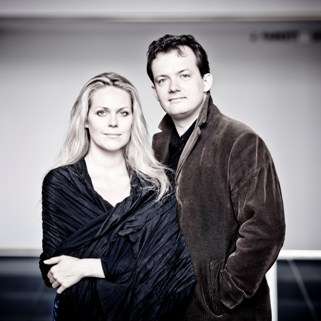|
Back
A Golden Couple Conquer London London
Royal Albert Hall
08/17/2013 -
Antonín Dvorák: Symphony No. 8 in G major, opus 88
Giuseppe Verdi: Otello: “Willow Song”& “Ave Maria”
Pyotr Iliych Tchaikovsky: Eugene Onegin, opus 24: “Polonaise” & “Letter Scene”
Johann Strauss II: Kaiser-Walzer, Opus 437 – Unter Donner und Blitzen, Opus 324
Kristine Opolais (soprano)
City of Birmingham Symphony Orchestra, Andris Nelsons (conductor)

K. Opolais, A. Nelsons (© Marco Borggreve)
Several days after Andris Nelsons made his debut at the Metropolitan Opera, I heard him conduct for the first time. That evening, there was yet another debut, this one unscheduled: Lise Lindstrom, who had been covering the role of Turandot, stepped in to great acclaim. At the Met, Nelsons was, of course, in the pit. From where I sat, it was impossible to observe his interactions with the musicians.
Hearing him conduct this time was a very different experience. In the magnificent Royal Albert Hall, there he was, front and centre. An ebullient and passionate musician with a truly whirlwind presence, he communicated with his orchestra using his entire being. By turns, Nelsons slashed the air, pointed, and beckoned – eliciting dynamic contrasts from a great roar of sound down to the barest hush. He crouched, he jumped, he even danced – at times with both feet off the podium. The mere tilt of his head, shrug of his shoulders, and even his slouches conveyed meaning and direction to musicians who were exquisitely responsive to him. The rapport was total. And the effect was riveting. Dvorák’s genial, optimistic, even joyous symphony became an unforgettable edge of the seat experience.
Nelsons and his band produced a tapestry of sound and colour, a richly detailed reading with magnificent ensemble playing (the strings were particularly sweet and lush) as well as exquisite details from the winds and horns. Lovely melodies poured forth as did surprising rhythmic effects. The musicians conjured up the atmosphere of the natural world, teeming with life, an atmosphere redolent of Bohemia.
The second and third selections on the programme were superb collaborations between the orchestra, Nelsons, and his wife, the soprano Kristine Opolais. In two ravishing but very different performances, she showed herself as not only a fine musician with a lovely voice but also a great dramatic actress. It is of course very difficult to create a character with a believable inner life in a short operatic excerpt on a concert platform. But she did. Twice.
First came “Willow Song” and “Ave Maria” from Verdi’s Otello. Opolais conveyed Desdemona’s touching, fragility and vulnerability so convincingly. Heartbroken, she is still in love with her murderously jealous husband – in love but also clearly in fear. Opolais’ musicianship was impeccable and her ethereal pianissimos sounded almost otherworldly. She acted with her voice but also with her marvellously expressive hands. The rapport between husband, wife and orchestra seemed almost telepathic.
Next on the programme was Tatyana’s letter scene from Eugene Onegin. Opolais gave a spot on portrayal of an immature, impetuous and besotted Tatyana. Vocally, she was again superb. I find it impossible to hear this wonderful music and not think of its tragic autobiographical element – the love letter from an equally besotted young woman that the composer received, a letter that led him into a doomed marriage (see here.
Three foot stomping selections rounded out the programme. In other hands, they could have emerged as routine and – pardon the pun – merely pedestrian. But, of course, with this conductor and this orchestra, not a bit of it. Already in the “Polonaise” from Eugene Onegin, which preceded the letter scene, I had the feeling that the audience was itching to move their feet. This was even more evident during the final two selections by Johann Strauss. Old chestnuts though they certainly are, they were performed with style, verve and brilliance.
As one would expect, the applause at the end was deafening. But there was one rather surprising and quite touching aspect to it. Despite earnest attempts by Nelson to get the orchestra to rise and take their bow, they refused to do so. Instead, they let him bask in the appreciation of the vast audience and even joined in the applause.
A very special Prom indeed.
The Proms
Andris Nelsons’ Website
Kristine Opolais’ Website
The CBSO’s Website
Arlene Judith Klotzko
|